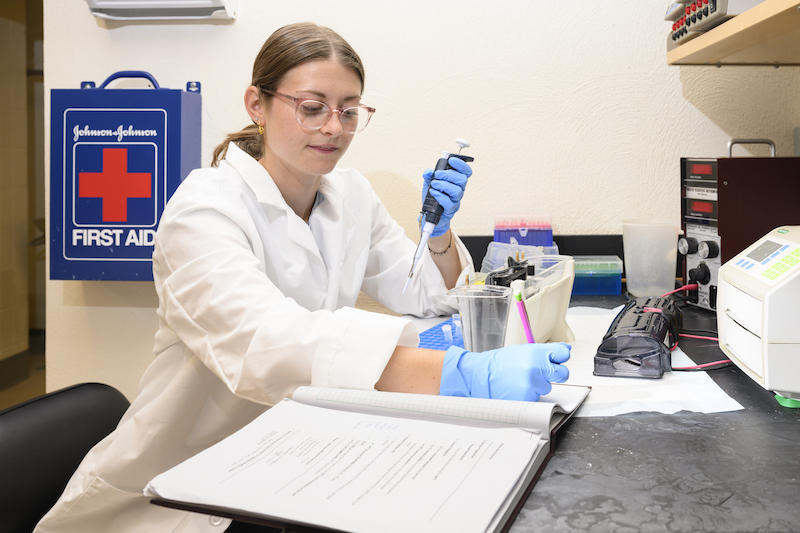


Looking into the body’s essential couriers
Photo by Kathy F. Atkinson September 10, 2025
UD undergraduate student explores proteins that may help to shape red blood cells
Editor’s note: Every year, hundreds of undergraduates at the University of Delaware pursue research under the guidance of a faculty mentor, especially during the summer months. Such experiences provided by UD — a nationally recognized research university — can be life-changing, introducing young scholars to a new field, perhaps even the path to a future career, as they uncover new knowledge. These spotlights offer a glimpse into their world.
You could think of red blood cells as a fleet of elite pack mules, all of whom are working 24/7 on your behalf, making essential collections and deliveries by way of your bloodstream. For example, when you breathe in, these cells collect essential fuel — oxygen — and deliver it to every part of your body. When you breathe out, your body throws out the carbon dioxide “trash” the cells have picked up along the way.
Unlike every other kind of cell in your body, healthy, mature red blood cells have no nucleus. The nucleus is ejected from the cells as they are formed, a process that makes it possible for them to carry more oxygen and flex more easily when they’re navigating tiny blood vessels.
These tiny-but-critical allies of human health have intrigued University of Delaware junior Gabriella Maletta of Sewell, New Jersey, who is majoring in human physiology and liberal studies, with a concentration in the Medical Scholars Program.
The whole process of red blood cell formation is especially fascinating to Maletta, who hopes to be a physician.
Under the supervision of Prof. Velia M. Fowler, chair of UD’s Department of Biological Sciences, Maletta spent the summer studying three septins — proteins that play important roles in cellular functions — to investigate their involvement in the process of red blood cell formation.
Q: Why did you want to pursue this? What intrigues you about the topic?
Maletta: I took an anatomy class during the spring semester of my sophomore year, and I really enjoyed the unit on blood. When I learned about this research project, I was excited to see that it focused on red blood cell proteins. What really drew me in was the fact that the specific protein I’m studying hasn’t been researched much yet in red blood cells. There’s still so much we don’t know about these proteins so there is a lot of room to ask questions, try different experiments and potentially discover something meaningful.
Q: Why does research like this matter?
Maletta: This research is important for deepening our understanding of red blood cell formation and the proteins involved in that process. Since proteins play a large role in cell function, identifying how a specific protein contributes to red blood cell structure could reveal important insights into potential causes of blood disorders such as anemias.
Q: What does your daily research/work entail? What have you been doing every day?
Maletta: I worked in a lab every day but what I did varied from day to day. Most of my experiments were completed over two days. During these experiments, I moved around a lot, going to different rooms to perform varying parts of the experiment. I do a lot of reading and analyzing my results during my incubation times. I also work on creating PowerPoint slides to show at our weekly lab meetings.
Q: What’s the coolest thing about being involved in this project? Have you had any surprising or especially memorable experiences?
Maletta: One of the coolest parts of this project is how much is still unknown due to the limited research done on these septin proteins in red blood cells and their precursor cells. Every day brings something new to learn and more questions to explore. A particularly memorable moment for me was my first lab meeting presentation. I was initially really nervous, but once I started presenting my findings, I felt more confident and excited. I really enjoyed sharing my results, getting feedback and hearing new perspectives on how to improve my experiments. It made me realize how collaborative science really is.
Q: Is there anything you've discovered about yourself and your career goals as you’ve worked on the project?
Maletta: I discovered my interest in research through this project. It is fascinating being able to actually test and experiment on different questions I have. This experience has helped me look deeper into problems and ask better questions which are all skills that connect directly to my goal of becoming a physician.
Q: What do you enjoy doing in your spare time?
Maletta: In my spare time, I love running, specifically doing guide races. I am a member of a club called Ainsley’s Angels where I get to push a wheelchair while doing a race. I get dressed up to race in a tutu and bows and run varying distances like a 5k or 10k. I also enjoy going to the Jersey beaches with my friends. I love sitting out in the sun, swimming in the ocean, and then getting dressed up to go to dinner. Getting ice cream after is a must, as it is one of my favorite foods.
Maletta was supported by a summer scholar award from the Delaware IDeA Network of Biomedical Research Excellence (INBRE) National Institutes of Health grant P20GM103446.
Contact Us
Have a UDaily story idea?
Contact us at ocm@udel.edu
Members of the press
Contact us at mediarelations@udel.edu or visit the Media Relations website

